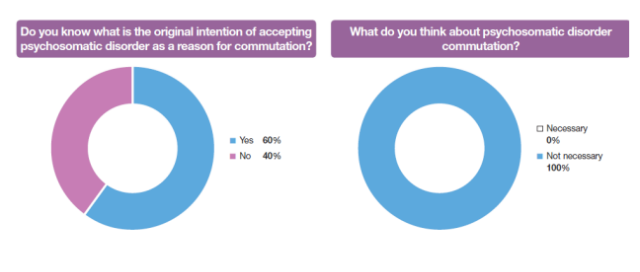Is Psychosomatic Disorder Considered a Reason for Commutation?
With the coming release of Cho Doo-soon, the felon, and the passage of the Yoon Chang-ho Law, a number of opinions have been raised about commutation based on psychosomatic disorder. Before the revision of the Yoon Chang-ho Law, there were many concerns that psychosomatic disorder could be abused as a defense for violent crime. Since the revision of the Yoon Chang-ho Law, opinions have been divided over whether psychosomatic disorder is a sufficient reason for commutation. What do you think about psychosomatic disorder as a reason for commutation? The Pharos wants to investigate in depth the case for accepting psychosomatic disorder to as a reason for commutation through an examination of arguments supporting commutation and examples of psychosomatic disorder.
Now, Korean law states the following: “If someone who has a psychosomatic disorder commits a crime, they can have their sentence commuted.” Therefore, people who get commutation due to psychosomatic disorder are tried and sentenced properly according to the law. However, public opinion says it is not fair that they receive light punishment because of a psychosomatic disorder when they commit a terrible crime, and this opinion has continued to be expressed for quite a long time. Then, why has this law not been abolished? The reason is associated with the definition and basic premise of a crime. The basic premise of a crime is “intentionality.” However, the psychosomatic disorder defense states that the perpetrator didn’t have the ability to make judgments about what was good or true. Thus, there is a question of whether a person who committed a crime under the influence of schizophrenia or drunkenness can be held responsible for the crime due to a lack of self-discriminatory ability. “When there is no responsibility, there is no punishment” is the basic principle of criminal law accountability.
What are the opinions of Kyonggi University students about the use of psychosomatic disorder as a reason for commutation? The Pharos conducted a survey to find out what Kyonggi University students think about this issue.
Based on the results of the survey, there are more students who know why psychosomatic disorder commutation was originally enacted than ones who do not, and the opinion that psychosomatic disorder commutation is not necessary was supported by 100% of the respondants. They said the reason for opposing this law is “There are a lot of cases that abuse this law.” Also, there are many students who think psychosomatic disorder commutation has to be aboloshed even though they know what the original intention of the commutation was. This can be taken as an expression of asserting the need for abolition of the law even when being aware of its intention and the contents of the law, rather than just being angry at the resalts of related cases.
If so, what are some cases that have raised concerns about the application of psychosomatic disorder as the reason for commutation? The case of the killing of a mother and the Gangseo-gu PC Room Incident are typical examples. The case of the killing of a mother is one in which the perpetrator killed her daughter. The perpetrator, who believed in a false religion, stabbed her daughter with a knife, thinking it was a ritual of exorcism. A subsequent psychological assessment showed that the perpetrator had low reasoning and thinking skills. Based on these results, it was decided the perpetrator must have low self-control and judgment. In the end, the court acquitted the person in the first trial and ordered treatment, accepting that she suffered from a psychosomatic disorder. In the second trial, the court also acquitted the person even though many people criticized that result. The Gangseo-gu PC Room Incident is also a well-known incident. The perpetrator stabbed a part-time worker and killed him brutally thinking that the service of the part-time worker was unkind. It seems that the perpetrator intentionally attempted to have his sentence reduced by saying that he had taken depression medication for 10 years. Concerned about this trend, people opposed to psychosomatic disorder as a reason for commutation filed a petition with the Blue House. The trial has not yet finished, but the case could have been influenced by the psychosomatic disorder argument. These incidents suggest that there are many people who are concerned that psychosomatic disorder as a reason for commutation will be misused contrary to the original aim of the psychosomatic disorder defense.
Let’s take a look at foreign cases that are different from those in Korea. In one case, someone who had stopped takings medicine for schizophrenia killed a man in Oakland. He was found innocent because of psychosomatic disorder due to schizophrenia, but he was confined to a treatment center after the trial as a “special patient” and had to receive indefinite care. Compared with this, the Korean system is different because after people are exonerated due to phychosomatic disorder, they are released. Also, there are cases that have recognized psychosomatic disorder caused by drunkenness. For example, the Cho Doo-soon case. He committed a terrible crime, but the court accepted his defense of psychosomatic disorder due to being in a drunken state, and his sentence was commuted. Different from Korea, Germany and France impose a heavier punishment on drunken criminals. Korean laws can seem odd when compared with those of other countries.

The guidelines for psychosomatic disorder are not easily implemented because they are associated with mental states. Therefore, this defense can be abused in ways that violate the original intention of the law. Therefore, Korea has to make a new law that will correctly adjudicate these cases, and prevent abuse by criminals. Also, a law can have a big effect, so it must be applied carefully. In every situation, those who commit a crime should be punished appropriately.
Planning Editor•LEE GAEUN•antonia0504@naver.com
71st Cub Reporter•KIM JIN•coo0714@naver.com
- TAG
-
 Shall We Dance?
There are moments that you want to get away from. Sometimes life is overwhelming and you might think that you’re too fragile. Due to personal reasons, I felt like that while working on this issue. Although I felt helpless, somehow I got over it. You control your own life. Your society is where you belong. You should take responsibility for your life and society and take good care of yourself. What I tried not to forget is this quote by Viv...
Shall We Dance?
There are moments that you want to get away from. Sometimes life is overwhelming and you might think that you’re too fragile. Due to personal reasons, I felt like that while working on this issue. Although I felt helpless, somehow I got over it. You control your own life. Your society is where you belong. You should take responsibility for your life and society and take good care of yourself. What I tried not to forget is this quote by Viv...

 [심층보도] 캠퍼스타운, 본교 발전의 초석 될까
[심층보도] 캠퍼스타운, 본교 발전의 초석 될까
 [와이파이] 성인 엑스포, 단순 행사인가 유사 성매매인가
[와이파이] 성인 엑스포, 단순 행사인가 유사 성매매인가
 [방구석 시사회] ‘괴물 형사’ 마석도, 네 번째 진실의 방으로
[방구석 시사회] ‘괴물 형사’ 마석도, 네 번째 진실의 방으로
 [진리터] 우후죽순 발생하는 이슈, 관심으로 찾을 수 있는 권리
[진리터] 우후죽순 발생하는 이슈, 관심으로 찾을 수 있는 권리

 목록
목록




















